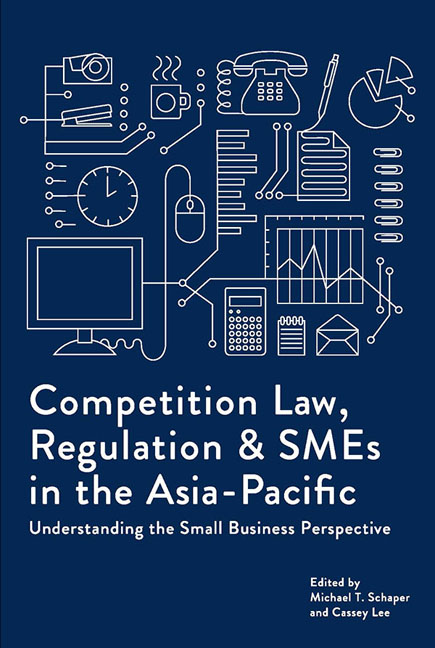 Competition Law, Regulation and SMEs in the Asia-Pacific
Competition Law, Regulation and SMEs in the Asia-Pacific Book contents
- Frontmatter
- Contents
- Foreword
- About the Contributors
- 1 Introduction: Making the Invisible SME More Visible in Competition Policy and Law
- Section 1 Theories And Basic Concepts
- Section 2 Smes And Competition Law
- Section 3 Country Studies
- 12 Competition Law, Regulation, and Trade: Implications for Productivity and Innovation in Singaporean Manufacturing SMEs
- 13 SME Law and Abuse of a Superior Bargaining Position in Japan
- 14 Competition Law, Policy, and Smes in South Korea
- 15 Competition Law Implementation and Smes: Singapore's Experience
- 16 Competition Law and SMEs in Indonesia
- 17 Smes and Malaysia's New Competition Law: Experiences to Date
- 18 Competition Policy and Sme Development in Vietnam
- 19 China's Anti-Monopoly Law and the Sme Sector
- 20 A New Competition Agency Learns to Deal with Smes: The Case of the Hong Kong Competition Commission
- 21 The Regulation of Television Programme Production Contracts under Japan's Subcontract Act
- 22 Small Enterprises and Competition Policy in Pacific Island Countries
- Index
22 - Small Enterprises and Competition Policy in Pacific Island Countries
from Section 3 - Country Studies
Published online by Cambridge University Press: 05 August 2017
- Frontmatter
- Contents
- Foreword
- About the Contributors
- 1 Introduction: Making the Invisible SME More Visible in Competition Policy and Law
- Section 1 Theories And Basic Concepts
- Section 2 Smes And Competition Law
- Section 3 Country Studies
- 12 Competition Law, Regulation, and Trade: Implications for Productivity and Innovation in Singaporean Manufacturing SMEs
- 13 SME Law and Abuse of a Superior Bargaining Position in Japan
- 14 Competition Law, Policy, and Smes in South Korea
- 15 Competition Law Implementation and Smes: Singapore's Experience
- 16 Competition Law and SMEs in Indonesia
- 17 Smes and Malaysia's New Competition Law: Experiences to Date
- 18 Competition Policy and Sme Development in Vietnam
- 19 China's Anti-Monopoly Law and the Sme Sector
- 20 A New Competition Agency Learns to Deal with Smes: The Case of the Hong Kong Competition Commission
- 21 The Regulation of Television Programme Production Contracts under Japan's Subcontract Act
- 22 Small Enterprises and Competition Policy in Pacific Island Countries
- Index
Summary
Competitive micro, small and medium enterprises (MSMEs) are crucial to private sector development in Pacific islands countries (PICs). MSMEs confront significant challenges, however, including pervasive state engagement in markets, high input costs, and difficulty in accessing legal remedies. Competition policy and law have an important role to play in enhancing business conditions for MSMEs in PICs. This chapter examines the setting in which competition policy and law operates in PICs and considers possible directions for their future development in the Pacific region. Conventional conduct prohibitions and penalties are likely to be necessary but not sufficient. Effective competition policy and law must be geared to the particular circumstances and needs of PICs, including the need to facilitate MSME entry to markets that have hitherto been closed to them. The policy and legal responses that suit the circumstances and needs of MSMEs in PICs may have wider applications in small developed economies or economies that are larger but still developing.
Introduction
The governments of most Pacific islands countries (PICs) have embraced private sector development as central to their strategies for economic development. Competitive markets are perceived as essential to such private sector development. Accordingly, the governments of several PICs are taking steps toward implementing competition policies or reviewing their regulatory institutions (ADB 2014a). Economic activity in most PICs is dominated by state-owned enterprises (SOEs) and a handful of multinationals or large privately-owned domestic enterprises. In several PICs, policymakers have been pursuing the corporatization and privatization of SOEs. Typically, there is little competition in the major infrastructure-based industries (telecommunications is an exception) but active competition, at least in urban areas, occurs among smaller scale businesses with lower capital requirements.
Policymakers in PICs, as in other developing economies, are therefore looking to micro, small and medium enterprises (MSMEs) as major drivers of the private sector development that is needed to generate economic growth, create jobs, and alleviate poverty (McIntyre 2001). MSMEs are pivotal to the emergence of competitive markets in PICs but face significant constraints on their ability to compete. While MSMEs in the Pacific bear the substantial weight of development expectations, they are poorly equipped to apprehend the implications of competition laws, obtain independent legal advice, enforce their rights, participate in the policy process, or otherwise advance their legal interests.
- Type
- Chapter
- Information
- Competition Law, Regulation and SMEs in the Asia-PacificUnderstanding the Small Business Perspective, pp. 370 - 386Publisher: ISEAS–Yusof Ishak InstitutePrint publication year: 2016


